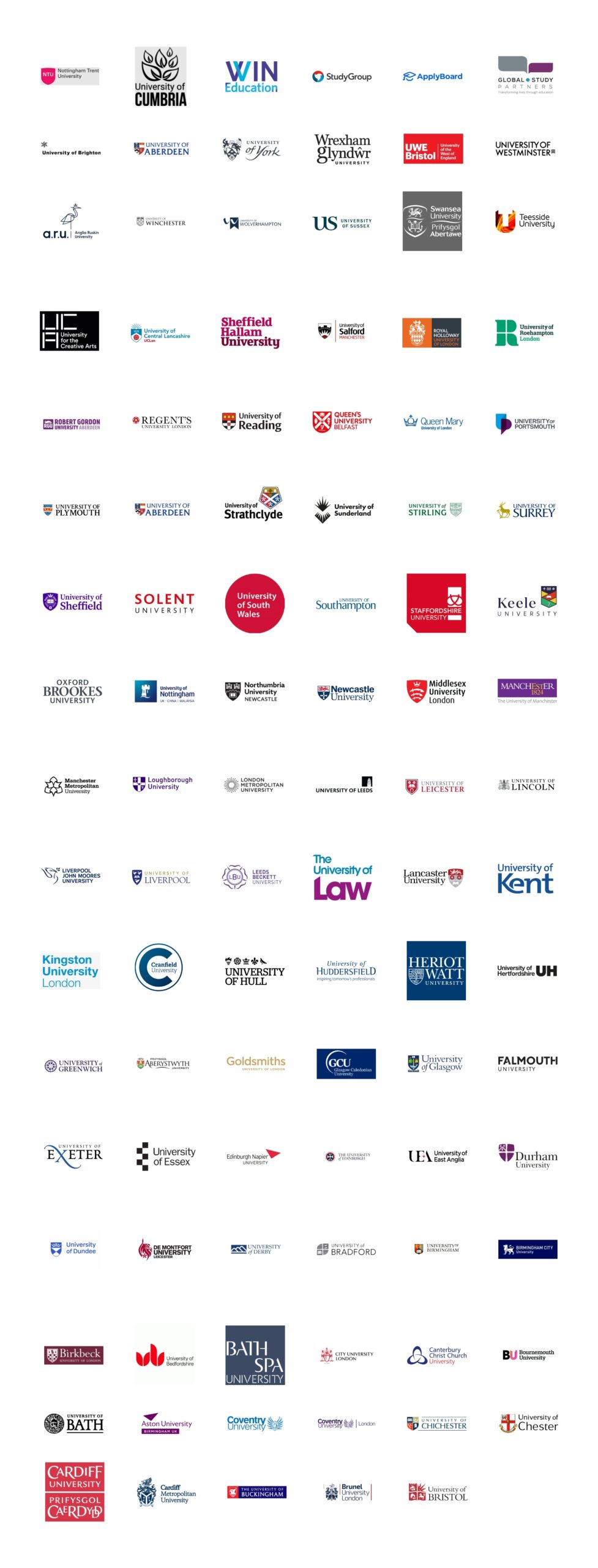United Kingdom
Why study in the UK?
London and the surrounding areas have a higher proportion of international students, due to higher availability of university and programme options.
Primary and secondary education in the UK is divided into four key stages, as shown below:
Key stage 1 = Grades 1-2 = Ages 5-7
Key stage 2 = Grades 3-6 = Ages 7-11
Key stage 3 = Grades 7-9 = Ages 11-14
Key stage 4 = Grades 10-11 = Ages 14-16
Primary education:
Primary school includes Years 1 to 6 (Key stages 1 and 2). Students remain in one classroom throughout the year and one teacher teaches all or most of the subjects. Every primary school has a library, assembly hall, playground, and computing facilities.
Key stage 1 – Students are introduced to basic knowledge and subjects. Mathematics, English, and science are the core subjects, but students also learn art and design, computing, design and technology, geography, history, physical education, and music. Students will complete national assessment tests that measure their development in English, mathematics, and science at the end of this stage.
Key stage 2 – Students gain more knowledge in core subjects as the curriculum becomes more in depth. Students are also introduced to modern foreign languages in this stage. Students will complete national assessment tests that measure their levels in English, including their reading ability, grammar, punctuation, spelling, and mathematics at the end of this stage. Teachers independently assess students’ level of progress in science.
Secondary education:
Students have their own tutor groups in secondary school, but are split up into different classes and students have their own timetable. Teachers usually specialise in teaching one or two subjects.
Key stage 3 – Students start to prepare for their GCSE national qualification. The curriculum still encompasses the core subjects, such as English, mathematics, and sciences, and also includes new subjects such as art and design, citizenship, religious education, history, geography, design and technology, music, languages, physical education, and sex and health education.
Key stage 4 – Students continue building deeper knowledge on key stage 3 subjects, which are now divided into core (English, mathematics, science) and foundation subjects (computing, citizenship, physical education). At this stage, schools must also provide relationships, sex and health education, and religious education as well as offer at least one of the following subject areas: arts, humanities, design and technology, and modern foreign languages.
Types of primary and secondary schools in the UK
State schools –
UK state schools are funded by their local authority or directly by the government and provide free education to UK students. State schools don’t accept international students unless the student is a dependent accompanying an adult international student. There are different types of state schools:
Community schools – follow the national curriculum
Foundation and voluntary schools – are funded by the local authority and sometimes supported by religious groups
Academies and free schools – have the freedom to follow a different curriculum
Grammar schools – include an entrance examination and select students based on academic ability
Faith schools – are affiliated with religious groups, most commonly the Church of England and the Roman Catholic Church
Private schools –
Private schools, or independent schools, charge tuition fees and don’t have to follow the national curriculum. Private schools are registered with the government and are inspected regularly. Some private schools offer study opportunities for students with special needs.
International students can apply to study at independent schools. Children who aren’t accompanied by their parents can enter the UK as long as they’re in compliance with Children Student Visa or student visa regulations if they wish to attend an independent school, sixth form college, or further education institution.
Boarding schools –
Both state boarding schools and independent boarding schools must meet strict government standards in academic and teaching quality. International and UK students can attend boarding schools.
Education at UK state boarding schools is free, but there are fees for boarding. Independent boarding schools charge tuition and boarding fees. Some students may only attend a boarding school during the day and return home to their families after school. Students’ adaptability and need for boarding is assessed by the schools.
Many boarding schools are century-old buildings with a combination of traditional and modern architecture. Students room with other students in a boarding house with communal areas, or there might be separate boarding houses on campus. A wide range of subject areas are offered at boarding schools including English, math, literature, foreign languages, science, history, geography, and drama.
Faith-based schools –
Faith-based schools have to follow the national curriculum, but they can choose what religious studies they want to teach and often have different admission criteria. Faith academies, however, don’t have to teach the national curriculum and have their own admission process.
The UK Council for International Student Affairs (UKCISA)
The UKCISA is a membership organisation and national advisory board that supports international students and provides training and guidance to schools, colleges, universities, and students’ unions.
International students, and all those who work closely with international students, can stay on top of current legislation and regulations as well as immigration rules and fees. They also offer a helpline for international students and parents, and provide websites, e-news updates, and additional online resources on: working and living in the UK, student support, fees and money information, Brexit-related information, visa and immigration information, and preparation and arrival.
Further education
Students move onto further education (FE) after completing their secondary school education and earn their GCSE.
Students can leave school in England if they turn 16-years-old by the end of summer of that school year, but they’re required to fulfil one of the following until they turn 18-years-old:
Stay in full-time education (eg. college)
Begin an apprenticeship
Spend 20 hours or more each week working or volunteering, while in part-time studies or training
Admission to further education programs is based on GCSE scores.
Academic qualifications (eg. A Levels, International Baccalaureate) required for university admission, while vocational qualifications provide more hands-on experiences that’ll help students move directly into the workforce.
There are several options available for further education.
Students between 16 and18 years who’ve completed their secondary education can enter sixth form or sixth form colleges, which mark the final two years of secondary education. Students typically spend these two years preparing for A Level or International Baccalaureate (IB) exams. Sixth form may also be called key stage 5.
A Levels
A Levels (Advanced Levels) are two-year programmes and are usually taken by students who want to pursue higher education. There are no compulsory A Level subjects, so students can choose subjects that interest them or will prepare them for their future studies or careers. Most students study three A Level subjects but they can take as many as five. A Levels are a common entry requirement for UK universities.
International Baccalaureate
The International Baccalaureate (IB) programme is similar to A Levels, but different in structure. The IB programme is more suited for students who’ve yet to decide on a specific subject. It prepares students for an easier transition from sixth form to university because it teaches them important higher education study skills, such as essay writing, research techniques, and productive reading skills. The IB programme also assesses students’ knowledge through an extended essay about a specific topic, an essay about the nature of knowledge, and 150 hours of creativity, activity, and service tasks (CAS).
Students are also encouraged to incorporate outside learning and personal development into their academic studies. IB programmes tend to be more challenging as opposed to A Levels, which are at a standard level of difficulty. Students often write exams in both A Level and IB programmes.
Vocational qualifications –
Some of the most popular vocational qualifications include:
Business and Technology Education Council Awards: These are vocational and work-related courses that provide students the opportunity to pursue further and higher education. Most universities accept BTECs as an equivalent to A Levels for some subjects.
T Levels: These are two-year courses which were developed in collaboration with industry employers to prepare students for work or future studies. T Levels mix classroom time and 315 hours (approximately 45 days) of on-the-job training.
National Vocational Qualifications or Scottish Vocational Qualifications: NVQs and SVQs are practical, work-related training for specific jobs such as plumbing or hairdressing. These programmes usually take one to two years to complete. NVQs are no longer included in the UK’s Regulated Qualification Framework (RQF), but previously achieved qualifications are still widely recognised by employers and individuals. Virtually all NVQs will have been converted into awards, certificates or diplomas. Scotland’s equivalent of this award are the SVQs and are still available for students.
1. International recognition – UK qualifications are widely recognised by employers and academics around the world. In fact, four UK universities are ranked in the top 10 of the QS World University Rankings 2024. Higher education institutions across the UK are regulated by the government, so students can be assured of getting the best education no matter what college they attend. UK universities and colleges also have a reputation for world-class research. Students have the opportunity to work with excellent teachers and have access to state-of-the-art technology and research.
2. Affordability – The UK is one of the most affordable countries for international students to pursue a quality education abroad. Courses are typically much shorter than those in other countries (eg. Canada, USA, Australia). International students can earn a bachelor’s degree after three years of full-time study and complete a Master’s degree in just one or two years. The shorter study duration helps reduce overall tuition fees and living expenses, not to mention allowing you to enter the job market sooner.
3. Multiculturalism – The countries that make up the UK (England, Scotland, Wales, and Northern Ireland) all have their own cultures, languages, and traditions. There are also people from all over the world of different races, religions, and ethnicities. Minorities make up approx. 15 per cent of the population. International students can feel comfortable and confident about being welcomed, because the UK accepts people from different cultures.
Bachelor’s degree = Completion of Advanced Level or Year 12 equivalent (subjects should be relevant for the chosen degree) with minimum 3 simple passes (top-ranked universities will require higher grades) and IELTS overall score of 6.0 – 6.5 with no band less than 6.0
Master’s degree = Completion of an accredited Bachelor’s degree (preferably in the same field of study) with minimum 1st class or upper 2nd class honours and IELTS overall score of 6.5 – 7.0 with no band less than 6.5. Relevant work experience is also desirable.
Doctoral degree = Completion of an accredited Master’s degree (preferably in the same field of study) and IELTS overall score of 7.0 – 7.5 with no band less than 7.0. Relevant work experience and existing research publications are also desirable.
10 – 100 per cent (depending on the university and applicant’s overall profile and past achievements)
APPLICANT( OUTER LONDON) – GBP9,207
APPLICANT( INNER LONDON) – GBP12,006
DEPENDENT (OUTER LONDON) – GBP6,120
DEPENDENT( INNER LONDON) – GBP7,605
Upto 20 hours per week and full-time during semester breaks
Relatively easy. Most international graduates secure full-time employment within just 3-6 months upon graduation.
Two years
You can apply for PR when your Post-Study Work Visa is close to the expiry date.
Our Partners and Principals

